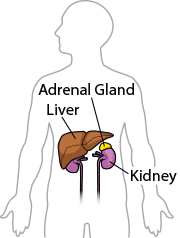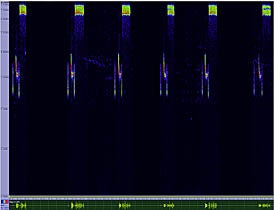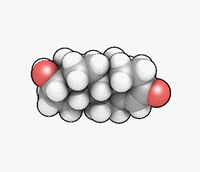
The adrenal glands sit on top of the kidneys.
Hormones
Imagine that you could shrink down to fit into a cell inside the adrenal glands, which are located on top of the kidneys. You want to tell the liver, which is located over on the right side of your abdomen, to start making sugar. How would you do this?
Well, one way would be to send the liver a message through the blood stream. Your blood passes through all parts of your body as it circulates. Just like putting a message in a bottle and dropping it into the river, your adrenal glands can release small molecules called hormones into the blood stream that will send their message. This is why hormones are called chemical messengers.
The nervous system is another way the parts of your body communicate, but instead of sending chemical messengers into the blood, nerves stretch out across the body and physically connect the different parts. You can imagine these as telephone lines carrying signals back and forth from your brain. The nervous system and hormone system work together, and many hormones are controlled by a part of your brain called the hypothalamus.
One hormone that you may have heard of is testosterone. Although both boys and girls have testosterone, after puberty, boys have much more of it. Testosterone has many different effects, such as the growth of facial hair and big muscles. This is why testosterone is sometimes called the male hormone.

|
Testosterone also makes males sing. That is, it makes male birds sing. Male birds sing in the springtime to attract female birds and to tell other males to keep away from their territory. Even though it may sound very pretty to us, to other male birds it may sound like, “Hey buster, keep away from my turf.” |
Read more about: Singing in the Rain
Bibliographic details:
- Article: Hormones
- Author(s): Dr. Biology
- Publisher: Arizona State University School of Life Sciences Ask A Biologist
- Site name: ASU - Ask A Biologist
- Date published:
- Date accessed:
- Link: https://askabiologist.asu.edu/bird-hormones
APA Style
Dr. Biology. (). Hormones. ASU - Ask A Biologist. Retrieved from https://askabiologist.asu.edu/bird-hormones
Chicago Manual of Style
Dr. Biology. "Hormones". ASU - Ask A Biologist. . https://askabiologist.asu.edu/bird-hormones
Dr. Biology. "Hormones". ASU - Ask A Biologist. . ASU - Ask A Biologist, Web. https://askabiologist.asu.edu/bird-hormones
MLA 2017 Style

Rotating view of a testosterone molecule. The red balls represent molecules of oxygen.
Be Part of
Ask A Biologist
By volunteering, or simply sending us feedback on the site. Scientists, teachers, writers, illustrators, and translators are all important to the program. If you are interested in helping with the website we have a Volunteers page to get the process started.

